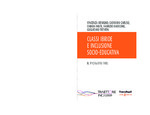Classi ibride e inclusione socio-educativa
il progetto TRIS
Author(s)
Benigno, Vincenza
Caruso, Giovanni
Fante, Chiara
Ravicchio, Fabrizio
Trentin, Guglielmo
Language
ItalianAbstract
Serious illness prevents many students from attending school on a regular basis and can lead to long-term absence from the classroom. The consequent isolation impedes socialization and educational exchange between homebound students and their schoolmates, as well as interaction with their teachers. Moreover, these students face serious difficulties when they eventually manage to return to school. All these factors slow down homebound students’ learning progress and weaken their sense of belonging to their peer group. In response to these issues, Italy’s Ministry of Education (MIUR), National Research Council (CNR), and the TIM Foundation set up a project in 2013 named TRIS (Networked Technologies and Socio-educational Inclusion). The main aim of the project is to develop a flexible and scalable intervention model for integrating homebound leaners. This is based on active and engaging learning approaches and is designed for application to a wide variety of long–term absence situations. The main pillar of the project is the so-called “Inclusive Hybrid Classroom”, a special blending of physical and digital learning spaces. By facilitating direct engagement in class activities, irrespective of the students’ actual location, this kind of classroom heightens the sense for everyone that the homebound student is actively present in the classroom.
Keywords
students; learning; homebound; integration; inclusion; hybrid classroomOCN
1135850272Publisher
FrancoAngeliPublisher website
https://www.francoangeli.it/Home.aspxPublication date and place
Milan, 2018Series
Traiettorie inclusive - Open Access, 4Classification
Education


 Download
Download Web Shop
Web Shop